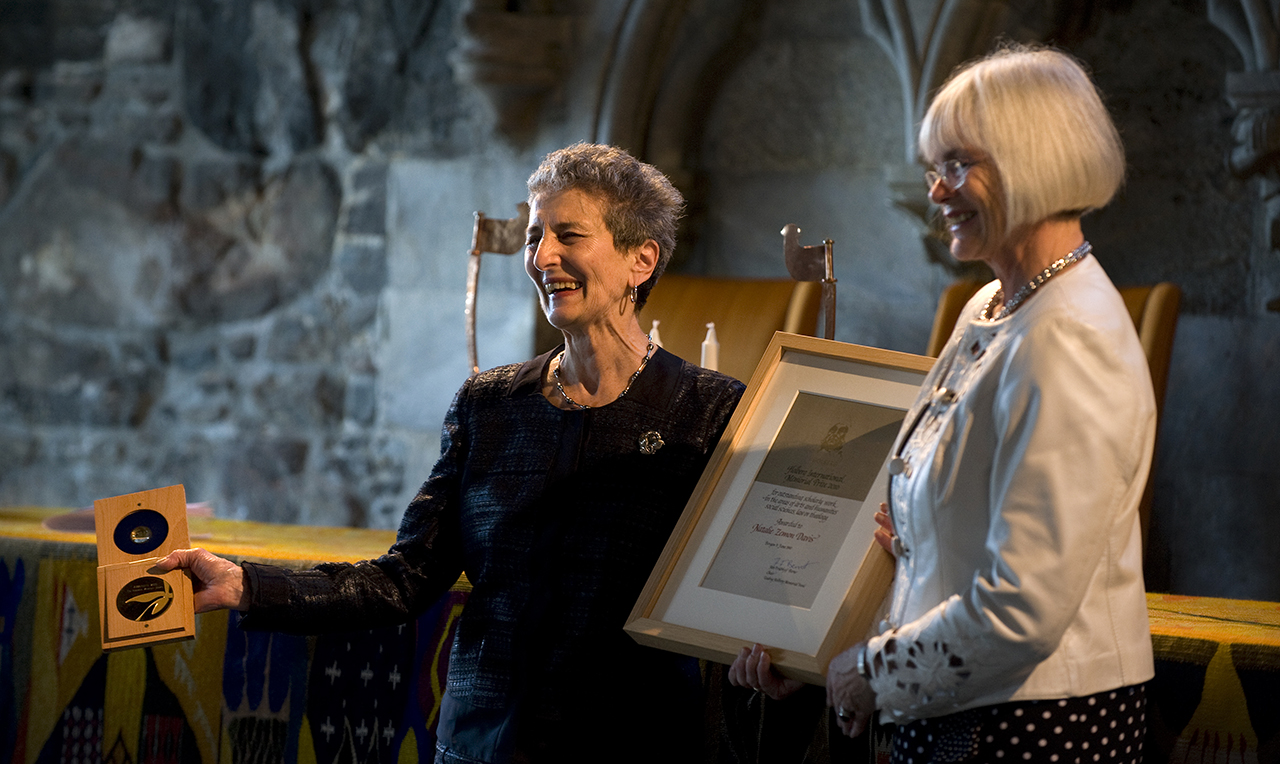In Memoriam: 2010 Holberg Laureate Natalie Zemon Davis

We are saddened by the passing of 2010 Holberg Laureate Natalie Zemon Davis on 21 October 2023.
An historian of the marginalized and oppressed, Natalie Zemon Davis was an academic and intellectual whose work spanned several generations of scholarship, extending also beyond the discipline of history in a narrow sense. Letting her very distinct work in history also be infused by insights from, for instance, anthropology, gender studies and literary critique, her work has in fundamental, playful and imaginative ways shaped the field of, in particular, French and European history.
Davis was conferred the Holberg Prize in a ceremony on 9 June, 2010 in Bergen. At the Holberg Symposium the previous day, she delivered her Holberg Lecture entitled “Decentering History”.
The Holberg Committee’s recommendation for awarding Natalie Zemon Davis the 2010 Holberg Prize is reproduced here in extenso:
“Natalie Zemon Davis is one of the most creative historians writing today, an intellectual who is not hostage to any particular school of thought or politics. Her writing is richly textured, multi-faceted and meticulously documented. She shows how particular events can be narrated and analyzed so as to reveal deeper historical tendencies and underlying patterns of thought and action. Her work brings gender to the fore, while insisting that the relationship between men and women is always embedded in the cultural discourses and social organizations specific to their time.
Davis’ imaginative approach to history, coupled with intensive archival research, makes the past come alive; her fundamental method is to pursue a dialogue between the past and the present. The uniqueness of her work lies in connecting early modern Europe with new areas of comparative history, exploring cultural, geographical and religious interchange.Her first book, Society and Culture in Early Modern France (1975), which emphasizes the dynamics of change and the agency of the individual, is widely acknowledged as path-breaking. The Return of Martin Guerre (1983) demonstrated to a broader public how an individual event in early modern France could illuminate overall mentalities and cultural contexts. Fiction in the Archives: Pardon Tales and their Tellers in Sixteenth-Century France (1987) analyzes the "fictional" character of legal documents, including first person testimonies. The Gift in Sixteenth-Century France (2000) uses the notion of "gifting" to illuminate the intricate forms of pre-market exchange and reciprocity. It has been called a model of historical anthropology. Women on the Margins: Three Seventeenth-Century Lives (1995) and Trickster Travels: A Sixteenth-Century Muslim between Worlds (2006) focus on individuals who belonged to different religions or moved between different societies, exploring the translation and transmission of cultures. Slaves on Screen: Film and Historical Vision (2000) dealt with the changing reception and the alteration of historical material in contemporary film. Her current work examines slavery in Suriname through the lens of generational encounters and crossings between slave and free, black and white, and people of different religions.
Natalie Zemon Davis’s contribution has provided many opportunities for innovative cross-fertilization between disciplines. She writes beautifully and knows how to tell a story, while at the same time remaining scrupulous in handling her empirical sources. The creativity and fearlessness of her work have inspired many younger historians, encouraging them to follow their own curiosity. As she herself has said: "I want to be an historian of hope who makes people aware of possibilities in the future".
After receiving the Holberg Prize in 2010, Natalie Zemon Davis remained active and continued publishing and participating in academic discourses and debates, continuing her work to re-centre those often marginal to traditional historical account and to humanize and complexify those often subsumed in somewhat stale and static categories. As she writes in 2019 , reflecting on the history course “Society and sexes”, which she taught at the University of California, Berkeley, in the 1970s, I had a double goal: to deepen European history through the inclusion of women and gender and to broaden the category of European women through the inclusion of people of different religions and status. I also wanted to connect students with the actual expression, the voices of people from the past.
Davis’ dedication to broadening and deepening the understanding of European as well as global history remained central until her passing.
Relevant links
Citation of the Holberg Committee
Interview with Natalie Zemon Davis
Natalie Zemon Davis’s 2010 Holberg Prize Acceptance Speech
Natalie Zemon Davis's 2010 Holberg Lecture: "Decentering History"
Natalie Zemon Davis's 2014 Holberg Anniversary Lecture: "Dealing with Strangeness"